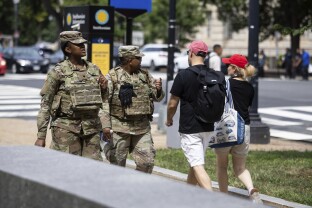Republicans on the House Oversight Committee are trying to move a series of bills that could reform how the nation’s capital handles crime in an effort to reinforce President Donald Trump’s efforts to crack down on lawbreaking in Washington.
In August, Trump deployed the National Guard to Washington, D.C., and announced a federal takeover of the police department — leading to widespread criticism from Democrats and praise from Republicans. Trump has since declared: “We don’t have a crime problem in Washington anymore.” The order from Trump expired on Tuesday, but Mayor Muriel Bowser has said D.C. police would continue working with the federal government.
Despite those developments, the 13 bills Republicans want to move would lead to major changes in how the capital deals with crime. If passed as written, they would restore cash bail, enforce mandatory sentencing minimums for certain crimes, end early release for certain crimes committed by people under the age of 18, criminalize outdoor encampments and lower the age for juveniles to be tried as adults for certain violent crimes from 16 to 14.
The bills would also create more congressional oversight by subjecting D.C. laws to a 60-day review, allowing line vetoes and extending review of D.C. regulations and mayoral orders.
One additional bill under consideration, introduced by D.C. Del. Eleanor Holmes Norton, would allow the city council to transmit legislation to Congress in an electronic form.
“While I do not believe there should be a congressional review process for bills enacted by D.C., we can at least bring the congressional review process into the electronic age,” Norton said in a statement.
Republicans are citing the Home Rule Act of 1973, which allowed Washington, D.C., to have limited self-government but granted power for congressional oversight of the D.C. budget and legislation.
“Under the Home Rule Act, Congress retains the right to enact legislation for D.C. on any subject, including legislation to amend or repeal any law in force in the District, prior to or after enactment, and any act passed by the D.C. Council,” Committee Chair James Comer said in his opening remarks Wednesday.
He added: “This Committee will exercise this authority to consider several pieces of legislation to reinforce President Trump’s efforts to make D.C. safe again.”
Democrats and Republicans in the House Oversight Committee markup, which is taking place Wednesday, have had testy back-and-forth discussions at times, highlighting the differences in position between the two parties on Trump’s actions.
“Quite frankly, if the president is so obsessed with governing D.C., he should step down as president and run for mayor,” Rep. Robert Garcia, the top Democrat on the committee, said in a heated introduction to the markup. “I urge members to vote ‘no’ on the Home Rule Reduction Act.”
Sign in
Log into your free account with your email. Don’t have one?
Check your email for a one-time code.
We sent a 4-digit code to . Enter the pin to confirm your account.
New code will be available in 1:00
Let’s try this again.
We encountered an error with the passcode sent to . Please reenter your email.


